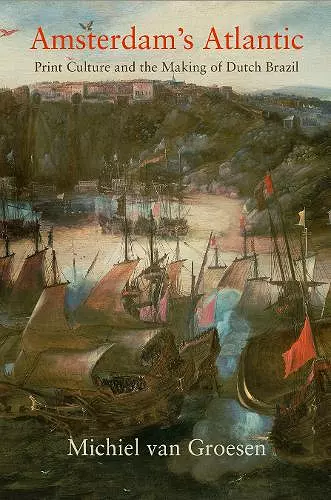Amsterdam's Atlantic
Print Culture and the Making of Dutch Brazil
Format:Hardback
Publisher:University of Pennsylvania Press
Published:17th Nov '16
Currently unavailable, and unfortunately no date known when it will be back

In 1624 the Dutch West India Company established the colony of Brazil. Only thirty years later, the Dutch Republic handed over the colony to Portugal, never to return to the South Atlantic. Because Dutch Brazil was the first sustained Protestant colony in Iberian America, the events there became major news in early modern Europe and shaped a lively print culture.
In Amsterdam's Atlantic, historian Michiel van Groesen shows how the rise and tumultuous fall of Dutch Brazil marked the emergence of a "public Atlantic" centered around Holland's capital city. Amsterdam served as Europe's main hub for news from the Atlantic world, and breaking reports out of Brazil generated great excitement in the city, which reverberated throughout the continent. Initially, the flow of information was successfully managed by the directors of the West India Company. However, when Portuguese sugar planters revolted against the Dutch regime, and tales of corruption among leading administrators in Brazil emerged, they lost their hold on the media landscape, and reports traveled more freely. Fueled by the powerful local print media, popular discussions about Brazil became so bitter that the Amsterdam authorities ultimately withdrew their support for the colony.
The self-inflicted demise of Dutch Brazil has been regarded as an anomaly during an otherwise remarkably liberal period in Dutch history, and consequently generations of historians have neglected its significance. Amsterdam's Atlantic puts Dutch Brazil back on the front pages and argues that the way the Amsterdam media constructed Atlantic events was a key element in the transformation of public opinion in Europe.
"[W]ell-researched and engagingly written . . . Although the wealth of evidence presented in the book underlines the specificity and even uniqueness of early seventeenth-century Amsterdam as a major 'information hub' whose characteristic 'discussion culture' provided a particularly hospitable environment for the elaboration of 'public opinion,' the work's skillful handling of a range of media stands as a model of interdisciplinary scholarship in an area of inquiry-the flow of information across the Atlantic in the early days of European colonization-with broad relevance." * Early American Literature *
"The short-lived colony of Dutch Brazil . . . is one of the least studied cases in the historiography of early modern empire. Michiel van Groesen now brings the disregarded colony into the limelight with a well-crafted analysis that reveals the importance of Dutch Brazil from a variety of perspectives. With a highly original approach that combines colonial, Atlantic, and urban history with the burgeoning field of the history of news and information management, van Groesen succeeds in showing how Dutch Brazil mattered, in the seventeenth century as well as today." * Journal of Modern History *
"In a commendable feat of archival work . . . Michiel van Groesen breaks new ground in his account of the Dutch West India Company's ultimately aborted attempt to seize Portuguese sugar colonies in Brazil." * Journal of Early Modern History *
"Van Groesen, with his thoughtful investigation of the movement of news and information . . . suggests how historians of other parts of the Atlantic world with less developed cultures of print might expose the routes that information took and the choices or circumstances that led to either its dissemination or its obstruction." * William and Mary Quarterly *
"Van Groesen shows the development of popular participation in politics and the rise of interest in mass psychology, and he offers an early example of the emergence of print media and official attempts to control it." * Journal of Interdisciplinary History *
"Invoking an impressively wide and rich set of sources, Michiel van Groesen provides a sharply focused history of the rise and fall of the Dutch West India Company's largest and most important colony in South America." * Benjamin Schmidt, University of Washington *
"By focusing on the flow of information from Brazil to Amsterdam, Europe's foremost news center in the seventeenth century, van Groesen delivers on his promise to show the relevance of Atlantic history for the Dutch Republic and vice versa. Amsterdam's Atlantic will not only be an eye-opener to historians unacquainted with the Dutch Atlantic but also surprise those familiar with the field." * Wim Klooster, Clark University *
ISBN: 9780812248661
Dimensions: unknown
Weight: unknown
272 pages